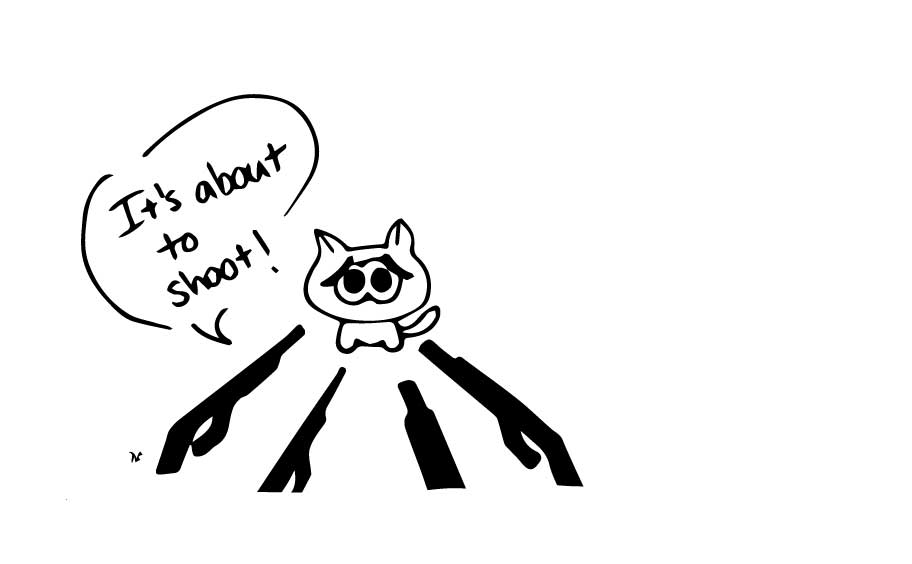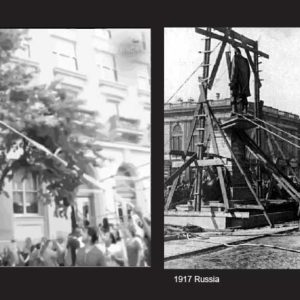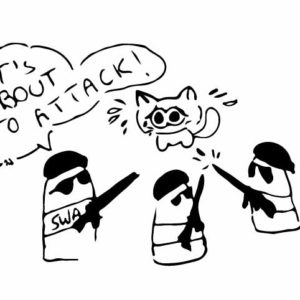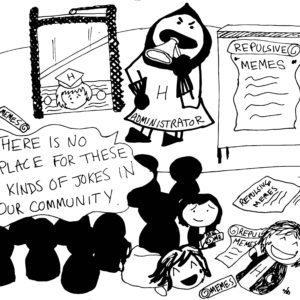
If you see someone at the corner with a gun in his pocket, what would happen if you jumped and killed him? Good luck getting out of jail. Your lawyer would have to prove beyond a reasonable doubt that your life was under imminent threat.
But there’s a double standard if you’re a cop.
Several days ago two police officers shot Alton Sterling in Louisiana, just because he had a gun in his pocket. The next day, another officer shot Philando Castile after a traffic stop when he informed the officer of his concealed carry permit and gun. These are not isolated incidents.
In December 2013, an officer killed unarmed student Robert Cameron on campus after stopping him for speeding. In August 2015 unarmed teenager Zachary Hammond was killed at a drive-through while getting a burger. Countless other cases never got public attention because there was no video or witnesses.
More than 1000 people were killed by police in 2015 (7% of all gun related deaths). At least 198 of them were unarmed. 39 police officers were shot and killed at same time period. In 2016, already 610 people have been killed by police.
Less than 3% of the nation’s local and state police agencies have reported fatal shootings by their officers to the FBI. Policemen were charged in less than 1% of police shootings cases. There is no denying that there is a problem.
Are we dealing with a few bad apples here? Are police officers racist? Yes, but there’s more.
In almost each case, officers claimed that they feared for their lives or somebody was not complying with an order. Fear for your life from noncompliance, legitimate or not, becomes a legitimate reason to kill. This is an extremely low bar—what if someone is deaf? What if he does not speak English, or simply panics under gunpoint and does not understand what is going on? Is that enough to justify murder?
Police rules are written under the completely wrong and anti-societal idea that the officers’ safety comes first, sometimes before the citizen’s safety, the constitution and the law. The USA is the only country (except a few run by dictatorships) where police adopt this idea.
In the video of Philando Castile, the officer was shaking and kept his gun pointed at a woman after he already killed her fiancé with four shots. She and her daughter stayed calmer than the officer.
Cops are hyper-vigilant in traffic stops. Traffic stops actually can be dangerous sometimes, and cops know this. They are trained to be hyper-alert with deadly videos of what can happen. There’s even the problem of cops shooting other undercover cops. And yet, stations have traffic stop quotas that they use to fund even more traffic stops. Sometimes they target those who can’t fight back to meet these quotas.
Ok. There are systemic problems with how police stations handle traffic stops. Police stations have interests that don’t align with public interests, as well as general inefficiencies.
Forgetting traffic stops for a bit. What about much more high-risk situations? In the Binghamton shooting in 2009, the 9th worst mass shooting since ’84, the first police officer arrived at the scene less than three minutes after the first shot. This is impressive, but they didn’t actually go in. SWAT only entered the building 40 minutes after the last shot. How many wounded victims died bleeding? In this case, supposedly nobody, but there is no way to really know in this case or in similar cases.
Pressed on why police didn’t go into the building, the police chief said that the information they were getting from the receptionist was still uncertain enough to warrant caution. “He was dead. We didn’t know it,” said the police chief. “If there’s a bunch of cops laying on the floor shot trying to rescue somebody else, it’s not going to help anybody.” Why would the cops be laying dead? The whole point is that the cops have weapons and defense gear, and the civilians inside do not have anything anything at all. What if the killer were alive longer? How long would it have taken to go in? Did they think that the man inside was somehow better armed than our militant police force? It seems like they prioritized police lives over hostage lives.
In the Orlando shooting, police officers stepped back not because they were wounded, but because the terrorist “overpowered” them. Then police negotiated for several hours. At least one hostage, an 18-year-old high school graduate bled to death from being shot in the arm during negotiations. There may have been legitimate concerns about going in—the criminal may have had a bomb. But it’s still a bit strange—they spent hours “negotiating” with a guy who pled allegiance to ISIS. He was there to kill, what was there to negotiate?
On the one hand, police use excessive force against small violators. On the other hand, police don’t want to step in when there is a serious crime.
Are they doing anything wrong? Technically no, and that is yet another tragedy. They follow the rules that prioritize officer safety, and these are the results.
Police stations have rules in place to protect officer safety. But these rules aren’t standardized across the board–there are no national or even state standards for officer safety. Each police department has its own rules. This was not always the case; it is possible that police privileges increased in the ‘70s and ‘80s with the War on Drugs. Before this, police were not as militarized.
Each year the police become more and more militarized. Why? Some officials say that this is necessary because people possess powerful weapons, like the AR-15, and so police must overpower them. But the AR-15 is not something new. These were on market since the 60’s. Moreover, prior 1986 you could buy select fire (military, fully automatic) AR-15s, so people had access to deadlier weapons than they do today. At the same time officers were carrying 6-shot revolvers. So this argument cannot be true—more militarization in police is not a response to an increase in civilian arms.
So the police have been getting better weapons and more legal leeway throughout the years. And there is no such a thing as personal responsibility for officers anymore—you can sue a police department, but not an officer. And so a seven-year-old girl dies during a SWAT-team raid at the wrong apartment.
Police are trained to protect themselves first. That is what disconnects police from society. If you look at almost any police video, you will see that in most cases nobody but the officers escalate conflict. That is what turns routine traffic stops into drama or even tragedy.
If we want to terminate police brutality, if we want to stop future murders, if we want to increase real police efficiency and public safety, we need to revise police training programs and rewrite the rules. So much of the current conversation has revolved around systemic racism, or “blue lives vs. black lives.” In today’s speech, President Obama blamed the current problems on racism and guns. He blamed the Orlando shooting on guns, and now blames police brutality on civilian gun ownership. Both times he missed the point. People also mention that we ask too much from officers, but this also misses the point; people are angry at the police because they do too much, too much violence against violators of non-violent crimes.
Yes, officer lives matter, and officers should not carelessly risk their lives, but they should remember that their duty is protect the citizens and public safety first, and their own safety second. They need to deescalate situations, not provoke them. We do not need officers who are terrified for their lives. Many officers are heroes who serve with integrity. The system needs to reflect those values, or else everything will get worse.





Hi,
thank You for this post.
I have just shared nataliadashan.com on my facebook.
What do You think about Brexit? Is it good for Britain?
Regards!
name
You write so holnetsy about this. Thanks for sharing!
Wow, incredible blog layout! How long have you been blogging for?
you make blogging look easy. The overall look of your web site is great, let alone the content!